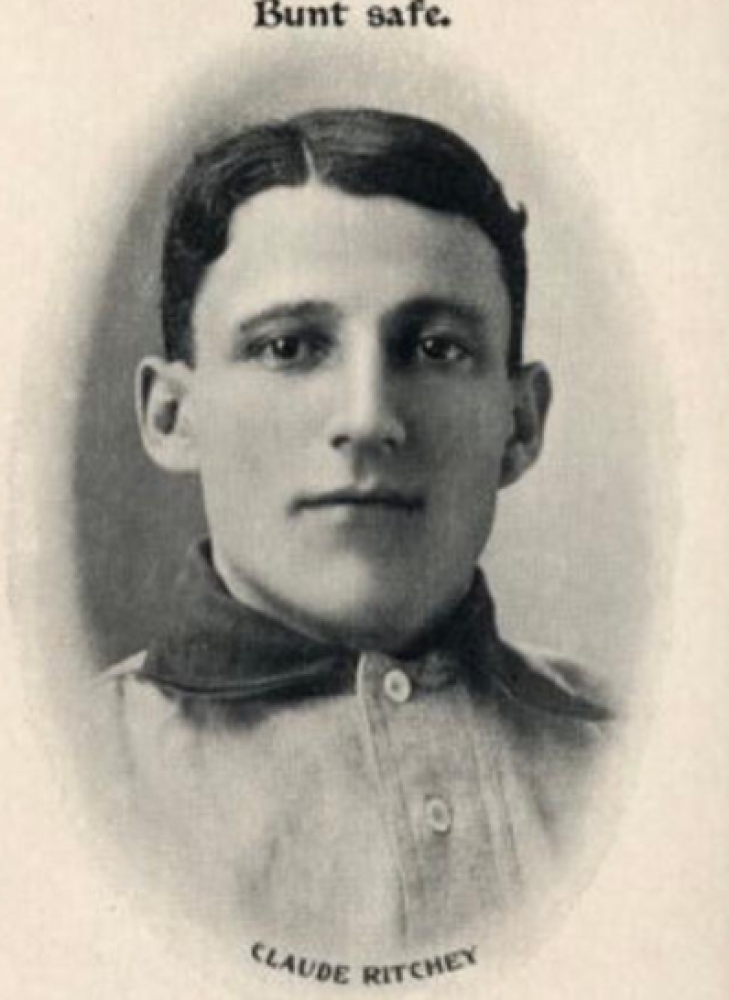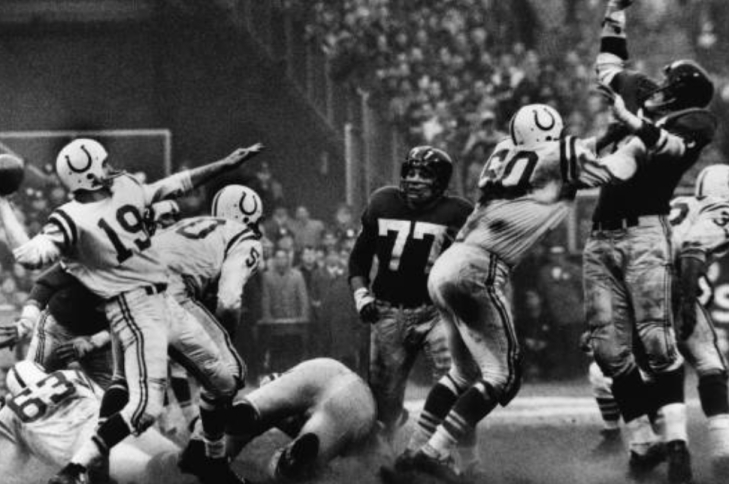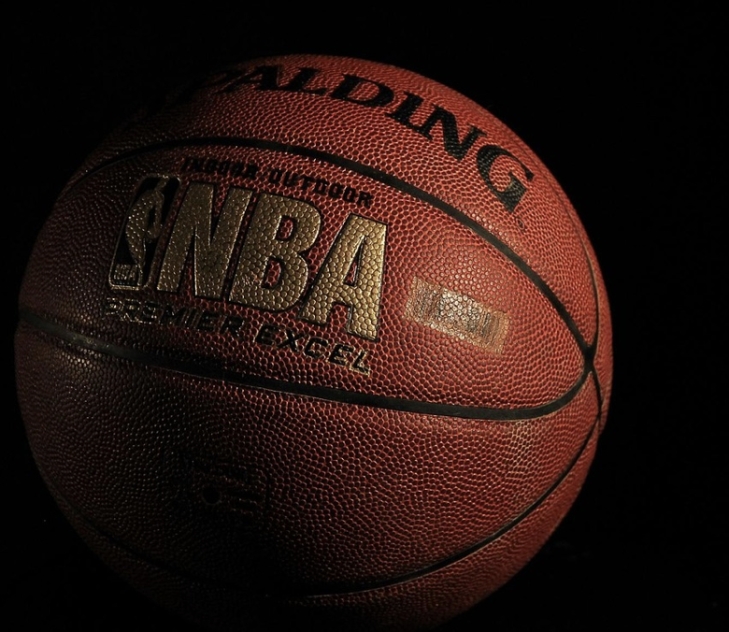
Committee Chairman
48. Claude Ritchey
Claude Ritchey was one of the 14 players that the Pittsburgh Pirates acquired from the dismantling of the Louisville Cardinals in 1899. Ritchey was not one of the bigger stars of the deal, but the infielder was one of the most dependable.
Ritchey played for the Pirates from 1900 to 1906, providing strong defense in the middle and had a solid 965 Hits with a .277 Batting Average and helped them reach the 1903 World Series. It was a decent run that was largely unnoticed as he played alongside Honus Wagner at Shortstop, but it is worth celebrating.
Top 10 NFL Quarterbacks Of All Time
As the 2025 NFL Scouting Combine comes to a close, football fans are abuzz with excitement about the upcoming draft and the potential talent that will soon join the league. The combine, which took place from February 24 to March 3, featured a wide array of prospects showcasing their skills in various drills and workouts.
While the quarterback class for the 2025 draft may not be as strong as previous years, it still holds promise with names like Carson Beck and Shedeur Sanders gaining attention.
However, as we look forward to the future of the NFL, it's also a great time to reflect on the past and rank the best quarterbacks the league has ever seen. Here's a look at the top NFL quarterbacks of all time, based on their performance, leadership, and impact on the game.
Top NFL Quarterbacks of All Time
1. Tom Brady
- Career Highlights: Seven Super Bowl wins, five Super Bowl MVPs, and three NFL MVP awards.
- Why He's the Best: Brady's unparalleled success and longevity make him the gold standard. His ability to perform under pressure and lead teams to championships is unmatched.
2. Joe Montana
- Career Highlights: Four Super Bowl wins, three Super Bowl MVPs, and two NFL MVP awards.
- Why He's Great: Known for his clutch performances, Montana is a legendary figure in NFL history. His leadership and ability to deliver in big games are iconic.
3. Aaron Rodgers
- Career Highlights: One Super Bowl win, two NFL MVP awards, and six Pro Bowl appearances.
- Why He's Elite: Rodgers is renowned for his incredible accuracy and ability to extend plays with his feet. His intelligence and mastery of the quarterback position are among the best.
4. Peyton Manning
- Career Highlights: Two Super Bowl wins, five NFL MVP awards, 14 Pro Bowl appearances.
- Why He's a Legend: Manning's intelligence and work ethic set him apart. He revolutionized the quarterback position with his ability to read defenses and make adjustments at the line.
5. Drew Brees
- Career Highlights: One Super Bowl win, one Super Bowl MVP, and seven Pro Bowl appearances.
- Why He's Great: Brees holds numerous NFL records, including career passing yards and completions. His consistency and accuracy over his career are unparalleled.
6. Dan Marino
- Career Highlights: Nine Pro Bowl appearances, one NFL MVP award.
- Why He's Iconic: Marino was a pioneer of the modern quarterback, known for his strong arm and quick release. Despite never winning a Super Bowl, his stats and influence on the game are undeniable.
7. John Elway
- Career Highlights: Two Super Bowl wins, one Super Bowl MVP, and nine Pro Bowl appearances.
- Why He's a Hero: Elway's leadership and athleticism made him a dual threat. He led his team to championships both as a player and later as an executive.
8. Jim Kelly
- Career Highlights: Four consecutive Super Bowl appearances, and five Pro Bowl appearances.
- Why He's Respected: Kelly's toughness and ability to perform under pressure earned him a place among the all-time greats. His leadership and clutch performances are legendary.
9. Steve Young
- Career Highlights: One Super Bowl win, two NFL MVP awards, and seven Pro Bowl appearances.
- Why He's Elite: Young's athleticism and intelligence made him a versatile quarterback. His ability to extend plays and make accurate throws on the run is still studied today.
10. Terry Bradshaw
- Career Highlights: Four Super Bowl wins, two Super Bowl MVPs, and three Pro Bowl appearances.
- Why He's a Champion: Bradshaw's leadership and big-game performances are iconic. He was the face of the Steelers' dynasty in the 1970s.
These quarterbacks have left an indelible mark on the NFL, and their achievements continue to inspire and influence the next generation of players. As the league moves forward with new talent emerging from events like the NFL Scouting Combine, it's fascinating to see how these legends will be remembered and how future quarterbacks will be measured against them.
NBA MVP Betting: The Biggest Snubs in Award History and How Odds Shifted
The NBA MVP award is supposed to honor the league’s most outstanding player each season. However, history tells a different story—one filled with controversy, unexpected winners, and betting odds that didn’t quite reflect reality. Some players dominated the court but still walked away empty-handed, leaving fans and bettors questioning the criteria behind the voting process. Understanding these snubs provides insight into how MVP betting odds can shift dramatically and why certain favorites don’t always come out on top.
1. Wilt Chamberlain (1961-62) – The Best Season Ever Ignored
Wilt Chamberlain’s 1961-62 season remains one of the most statistically dominant in NBA history. He averaged 50.4 points and 25.7 rebounds per game—numbers that seem impossible today. Despite that, the MVP award went to Bill Russell, whose Boston Celtics finished with a better record.
At the time, there was no widespread media coverage as is standard today—no NBA player updates flooding social media, no daily debates shaping public perception. Instead, MVP voting was heavily influenced by team success and traditional sportswriters’ opinions. Had more extensive sports coverage (or even social media for that matter) been the norm, Chamberlain’s record-breaking performances would have dominated headlines, possibly shifting voter sentiment.
This was a prime example of how MVP voters valued team performance over individual effort. Chamberlain’s betting odds likely made him a favorite, but once voters focused on team success, Russell’s odds would have surged (especially as the season drew to a close). This serves as a reminder that even overwhelming stats don’t guarantee MVP honors if the team isn't in contention.
2. Michael Jordan (1996-97) – The Voter Fatigue Effect
Michael Jordan was the face of the NBA in the 1990s, but that didn’t stop him from being snubbed in the 1996-97 MVP race. Karl Malone won the award despite Jordan leading the Bulls to a 69-win season while averaging 29.6 points per game.
This was a textbook case of voter fatigue—when a player is so dominant for so long that voters look for fresh candidates. Jordan’s odds likely reflected his dominance and his standing in the MVP race throughout the season, but as media narratives shifted toward Malone’s contribution to the Jazz, the betting lines adjusted - and one of the generation’s greatest players lost out. This demonstrates how external narratives, rather than pure performance, can drive MVP outcomes.
3. Shaquille O’Neal (1999-2000) – The Near-Unanimous MVP That Wasn’t
Shaquille O’Neal was nearly the unanimous MVP in 2000, except for one voter who selected Allen Iverson instead. While this didn't change the result, it highlighted the unpredictable nature of voting. A single rogue vote meant that O’Neal wasn’t the unanimous choice - and that must have rankled.
In the betting markets, heavy favorites like Shaq tend to see their odds shorten early, but unexpected votes or media storylines can create last-minute fluctuations. This case proves that even when a winner seems inevitable, external factors—like voter bias—can influence final results.
4. Steve Nash (2005-06) – Did Stats Matter?
Steve Nash winning back-to-back MVPs was already controversial, but his 2006 victory over Kobe Bryant remains a defining snub. Bryant averaged 35.4 points per game and had multiple historic performances, yet Nash, who led a high-paced Suns team, took home the award.
Bryant’s MVP betting odds would have been favorable, especially after his 81-point game. However, MVP voting has always valued team records and efficiency, which worked in Nash’s favor. This case underscores how betting lines can shift based on voter preferences rather than statistical dominance.
5. LeBron James (2010-11) – The Derrick Rose Narrative Shift
LeBron James was arguably the best player in the world during the 2010-11 season, but Derrick Rose won MVP, largely because voters wanted to reward a fresh storyline. Rose led the Bulls to the best record in the NBA, while James, who had recently joined Miami, was dealing with a public relations battle over “The Decision” - James' highly publicized announcement on July 8, 2010, where he revealed his decision to leave the Cleveland Cavaliers and join the Miami Heat.
Betting markets initially favored James, but as Rose’s impact became clearer and media narratives intensified, the odds shifted. This moment emphasized how MVP betting isn’t just about stats—it’s about perception.
Betting Takeaways from MVP Snubs
These historical snubs reveal important trends for MVP betting:
- Team success often outweighs individual dominance. Even the most statistically impressive players don’t always win if their team struggles. Bettors should keep this in mind when betting on NBA odds, as a player's performance alone isn’t always enough to secure the award.
- Media narratives can drastically shift odds. A strong season-long performance isn’t enough if a compelling storyline emerges for another player.
- Voter fatigue impacts multi-time winners. Once a player has won multiple MVPs, voters tend to look elsewhere, which can impact odds late in the season.
While betting on MVP favorites seems logical, history shows that surprises happen when least expected. Tracking how narratives develop throughout the season is just as crucial as analyzing on-court performance. Now you have an excuse to stay up to date with all things NBA related - as if you needed one.
Our Notinhalloffame.com Baseball List has been revised from 141-160
We are diligently working away at Notinhalloffame on revising our Baseball and Football lists to reflect the winter’s respective classes.
As such, we are pleased to announce that we have revised 141-160 on the NIHOF Baseball list.
Those ranked are:
#141. Jamie Moyer
#142. Al Dark
#143. Mel Harder
#144. Sam McDowell
#145. Camilo Pascual
#146. Silver King
#147. Nomar Garciaparra
#148. Jose Cruz
#149. Dizzy Trout
#150. Jorge Posada
#151. Mark Langston
#152. Wilbur Wood
#153. Hippo Vaughn
#154. Bobby Veach
#155. Jimmy Sheckard
#156. Elston Howard
#157. Mark Grace
#158. Jason Giambi
#159. Jimmy Key
#160. Dolph Camilli
The current (and under construction) list is here.
Look for more updates soon!
Thank you all for your support of Notinhalloffame.com.





